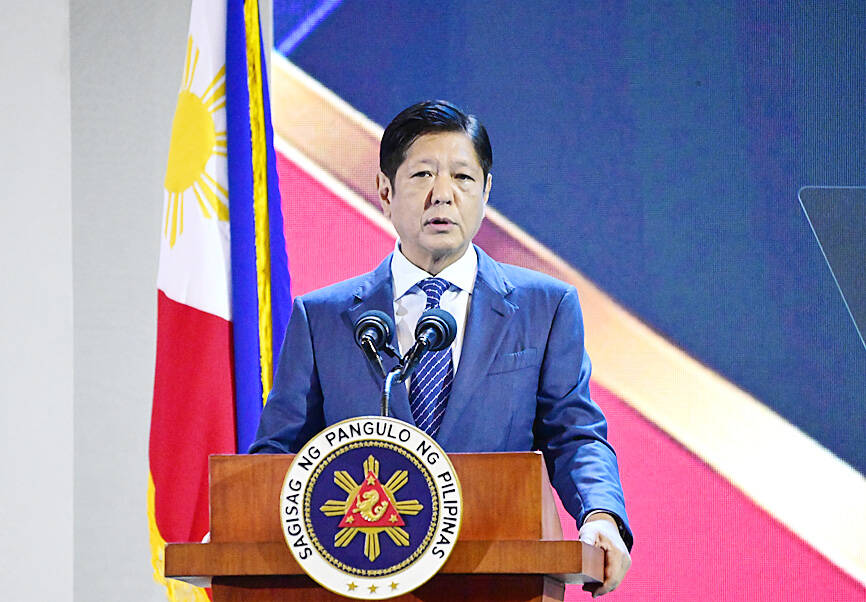Philippine President Ferdinand Marcos Jr has eased travel restrictions for Philippine government officials to Taiwan, with the goal of increasing opportunities for the development and expansion of the country’s priority areas of investments, the Philippine News Agency (PNA) reported yesterday.
The travel limitations were first imposed in 1989 during the administration of former Philippine president Corazon Aquino. The executive order had banned all Filipino government officials from making official visits to Taiwan, meeting with Taiwanese officials, or engaging in any official activity related to Taiwan without permission from the Philippine Department of Foreign Affairs (DFA).
Marcos on Tuesday last week signed Memorandum Circular, with the content being made public yesterday.

Photo: CNA
Under the new policy, travel restriction would only apply to the president, vice president, secretary of foreign affairs and secretary of national defense, the PNA said.
Philippine officials who are to visit Taiwan for economic, trade and investment purposes are required to use their “ordinary passports and without using their official titles,” the report said.
They must also inform and coordinate with the Manila Economic and Cultural Office (MECO) in Taipei, the Philippines’ de facto embassy in Taiwan, before their trip.
The new policy also allows Filipino officials to host Taiwanese delegations for economic discussions, but MECO should be notified at least five days before the meetings.
The memorandum further stipulates that no official documents can be signed with Taiwanese government agencies without prior approval from the DFA and the Office of the President, the report said.
In Taipei, Minister of Foreign Affairs Lin Chia-lung (林佳龍) affirmed the Philippine government’s efforts to enhance relations between Taiwan and the Philippines, adding that the new policy would deepen practical cooperation between the two countries under the framework of integrated diplomacy.
The Ministry of Foreign Affairs also said in a statement that Taiwan is the Philippines’ eighth-largest export market, ninth-largest trade partner and 10th-largest source of imports.
“As President Ferdinand Marcos Jr has said, the stability across the Taiwan Strait is the priority, and peace, safety and stability is the concern of all nations. Taiwan will continue work with the Philippines and other democratic allies and make contributions to the regional prosperity, peace and stability,” the ministry said.

SECURITY: As China is ‘reshaping’ Hong Kong’s population, Taiwan must raise the eligibility threshold for applications from Hong Kongers, Chiu Chui-cheng said When Hong Kong and Macau citizens apply for residency in Taiwan, it would be under a new category that includes a “national security observation period,” Mainland Affairs Council (MAC) Minister Chiu Chui-cheng (邱垂正) said yesterday. President William Lai (賴清德) on March 13 announced 17 strategies to counter China’s aggression toward Taiwan, including incorporating national security considerations into the review process for residency applications from Hong Kong and Macau citizens. The situation in Hong Kong is constantly changing, Chiu said to media yesterday on the sidelines of the Taipei Technology Run hosted by the Taipei Neihu Technology Park Development Association. With

‘FORM OF PROTEST’: The German Institute Taipei said it was ‘shocked’ to see Nazi symbolism used in connection with political aims as it condemned the incident Sung Chien-liang (宋建樑), who led efforts to recall Democratic Progressive Party (DPP) Legislator Lee Kun-cheng (李坤城), was released on bail of NT$80,000 yesterday amid an outcry over a Nazi armband he wore to questioning the night before. Sung arrived at the New Taipei City District Prosecutors’ Office for questioning in a recall petition forgery case on Tuesday night wearing a red armband bearing a swastika, carrying a copy of Adolf Hitler’s Mein Kampf and giving a Nazi salute. Sung left the building at 1:15am without the armband and apparently covering the book with a coat. This is a serious international scandal and Chinese

A US Marine Corps regiment equipped with Naval Strike Missiles (NSM) is set to participate in the upcoming Balikatan 25 exercise in the Luzon Strait, marking the system’s first-ever deployment in the Philippines. US and Philippine officials have separately confirmed that the Navy Marine Expeditionary Ship Interdiction System (NMESIS) — the mobile launch platform for the Naval Strike Missile — would take part in the joint exercise. The missiles are being deployed to “a strategic first island chain chokepoint” in the waters between Taiwan proper and the Philippines, US-based Naval News reported. “The Luzon Strait and Bashi Channel represent a critical access

COUNTERINTELLIGENCE TRAINING: The ministry said 87.5 percent of the apprehended Chinese agents were reported by service members they tried to lure into becoming spies Taiwanese organized crime, illegal money lenders, temples and civic groups are complicit in Beijing’s infiltration of the armed forces, the Ministry of National Defense (MND) said in a report yesterday. Retired service members who had been turned to Beijing’s cause mainly relied on those channels to infiltrate the Taiwanese military, according to the report to be submitted to lawmakers ahead of tomorrow’s hearing on Chinese espionage in the military. Chinese intelligence typically used blackmail, Internet-based communications, bribery or debts to loan sharks to leverage active service personnel to do its bidding, it said. China’s main goals are to collect intelligence, and develop a